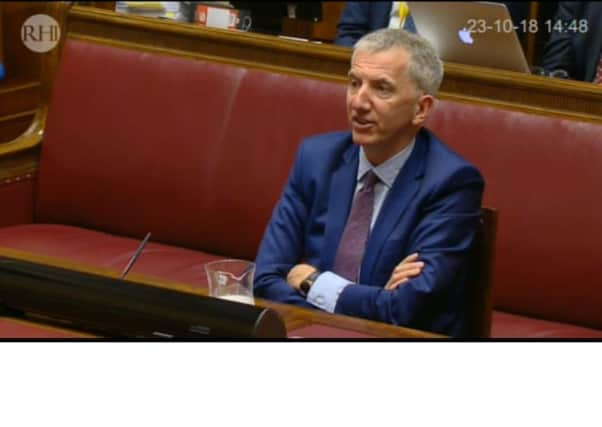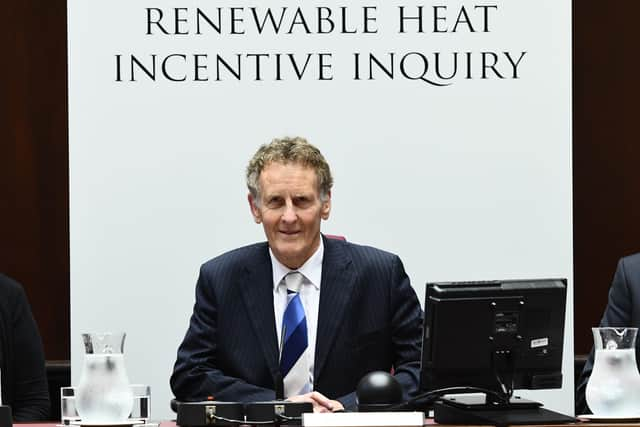RHI Inquiry Verdict: Sinn Fein minister Mairtin O’Muilleoir sought consent from senior unelected republican for cost controls


The findings into the ‘Cash for Ash’ scandal, released today at 2pm, do not accept that the then Stormont finance minister, Mairtin O’Muilleoir, was — as he said — merely consulting Ted Howell, an influential republican in Sinn Fein, about the timing of retrospective cost controls, but sought his consent to the plan.
The report was referring to a episode late in the saga, in January 2017, as power-sharing was on the brink of collapse, and the RHI scheme was long since known by the executive to have ballooned in cost.
Advertisement
Hide AdAdvertisement
Hide AdTed Howell, who was a member of the Sinn Fein Ard Chomharile (National Executive), had been said to have “been brought out of retirement” by the late Martin McGuinness.


Mr O’Muilleoir e-mailed Mr Howell on January 4 2017 to say the “DUP believe they now have a solution based on bringing all boiler owners back to a reduced payment which has been in place since November 15 2015 for those who applied to the scheme late”.
On January 24 he e-mailed Mr Howell again to indicate that there was no further reason to relay holding up a business plan on retrospective cost controls.
“Would you be content if I were to sign off on the business plan on Wednesday afternoon?” he wrote. “It remains a flawed plan, but is the only show in town with a strong chance of saving £27 million to the public purse.”
Advertisement
Hide AdAdvertisement
Hide AdWhen asked by the inquiry in autumn 2018 why he, as a minister who was democratically responsible to the assembly, was asking Mr Howell whether he was content that he should comply with the advice, Mr O’ Muilleoir said: “I’m telling Ted Howell that my decision has now been made ... I’m telling him, as someone who is heading up a crisis committee, dealing now with the collapse of government ... that this is what is going to happen.”
Yesterday’s report noted that Mr O’ Muilleoir was giving Mr Howell his place as head of a Sinn Fein “crisis committee” and asking him about the timing rather than permission to sign off.
It noted his comment that “this is a political world, and we cannot divorce what was happening from the collapse of the executive”.
The inquiry said it was emphasising “that it heard no detailed personal evidence about Mr Howell or his role in the Sinn Fein party other than that he was chair of the Sinn Fein ‘crisis committee’”.
Advertisement
Hide AdAdvertisement
Hide AdThe findings continued: “He did not hold accountable elected office. The inquiry finds that the wording of the 24 January email was not limited to approving the timing but also encompassed seeking Mr Howell’s consent to the proposed course of action by an executive minister.”
The report findings then goes on to note that Mr O’ Muilleoir, who set up the inquiry, was giving evidence to a probe into matters such as “transparency and accountability”.
It said: “The inquiry is conscious that the evidence that it received from Minister O’ Muilleoir was received in the course of an inquiry instituted in order to restore public confidence in the workings of Government. Transparency and accountability are key elements in maintaining such confidence.”
The report says that “the heightened degree of suspicion, lack of co-operation and lack of trust between the political parties with respective responsibility for DfE [Department for the Economy] and DoF [Department of Finance] during the period from late 2016 to early 2017 did not facilitate the particular and pressing need for the achievement of a timely solution of the RHI problem in the public interest”.
Advertisement
Hide AdAdvertisement
Hide AdIt adds: “In this context, the inquiry notes the wording of the ministerial pledge of office contained in the Belfast Agreement and referred to in sections 16, 18 and 19 of the Northern Ireland Act 1998 ‘... to serve all the people of Northern Ireland equally...’”
The report says of Special Advisers: “It is clear from the evidence received by the Inquiry that both of the two main parties in the Execttive, the DUP and Sinn Fein, breached the spirit and/or provisios of the 2013 Act [Civil Service (Special Advisers) Act (NI) 2013)] passed by the Assembly and the mandatory codes issued by DFP in accordance with sections 7 and 8 of that Act in one way or another.”
It adds: “... The Inquiry finds that the practices adopted by the DUP and Sinn Fein in centralising the appointment, control, and management of Spads effectively frustrated that purpose of the democratically enacted legislation.
“As a consequence, some Spads wielded very significant powere and were encouraged to see themselves as more directly responsible to the central authority or OFMDFM and their political parties, than to their individual ministers.”